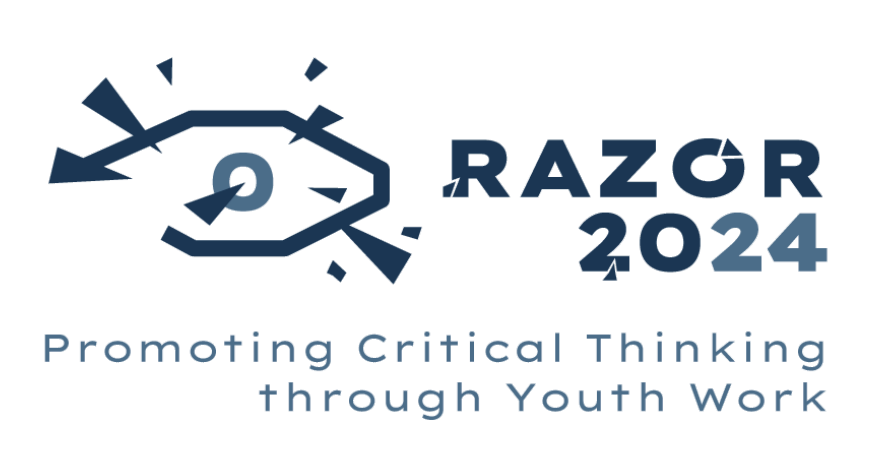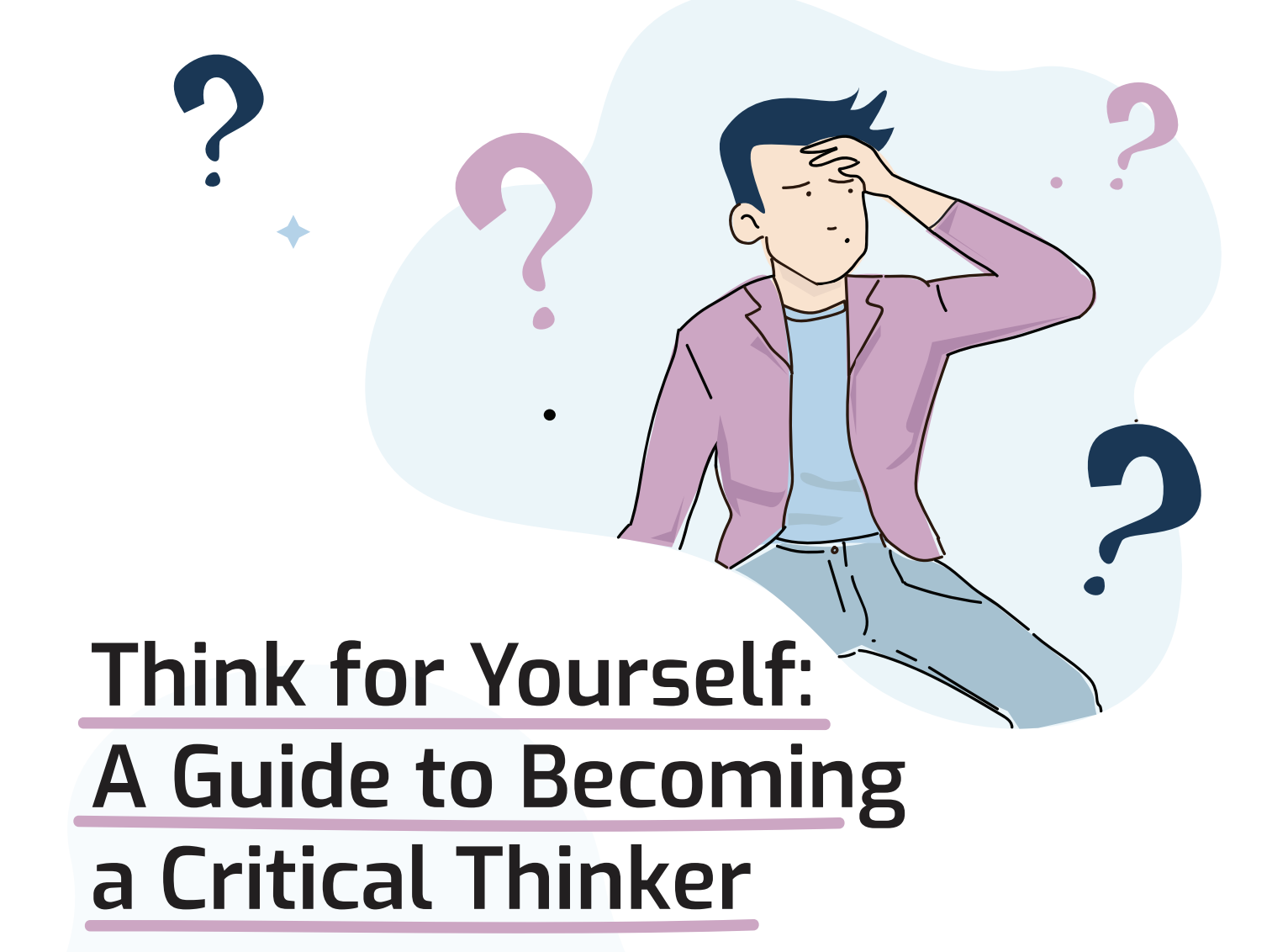
Erasmus+ activity Razor 2024: Promoting critical thinking through Youth Work
Erasmus+
There is no active citizenship nor democracy without critical thinking. Youth workers are on the forefront of shaping a healthy and resilient society that can withstand disinformation and faulty reasoning. Most importantly, youth need to strengthen critical thinking skills to boost their citizenship competence. However, many youth organisations lack the capacity to promote critical thinking through their activities.
Moreover, youth workers lack methods applicable in non-formal settings in work with disadvantaged youth.
Moreover, youth workers lack methods applicable in non-formal settings in work with disadvantaged youth.
The aim of the activity is to increase the quality of youth work of partner organisations in promoting critical thinking. Aim will be achieved through three specific objectives:
● increasing knowledge and skills of partners' youth workers related to critical thinking and conspiracy theories;
● equipping youth workers with non-formal tools to foster critical thinking through youth work;
● exchanging experiences of participating organisations on how to use non-formal education
in promoting critical thinking among youth.
● increasing knowledge and skills of partners' youth workers related to critical thinking and conspiracy theories;
● equipping youth workers with non-formal tools to foster critical thinking through youth work;
● exchanging experiences of participating organisations on how to use non-formal education
in promoting critical thinking among youth.
Think for Yourself: A Guide to Becoming a Critical Thinker
In this guide, we'll dive deep into the art of critical thinking and equip you with the tools to navigate the minefield of misinformation out there.

What was the topic of the training and why that topic is important?
Why you personally choosed to participate in the project with such topic?
Why you personally choosed to participate in the project with such topic?
VIKTORIJA.S:
The topic of the training was critical thinking, which is essentially important in nowadays world. We never been exposed to such big amount of information and learning how to navigate in it is valuable skill.
I personally chosen to participate in such project because my degree of anthropologist requires critical thinking both at work and studies, therefore learning new ways how to be less biased and more conscious of my thinking is key component of my everyday life.
I personally chosen to participate in such project because my degree of anthropologist requires critical thinking both at work and studies, therefore learning new ways how to be less biased and more conscious of my thinking is key component of my everyday life.
What was the topic of the training and why that topic is important?
Why you personally choosed to participate in the project with such topic?
Why you personally choosed to participate in the project with such topic?
EKATERINA:
Topic was critical thinking. Critical thinking is a crucial skill in our lives for a conscious life and decision making.
Would love to be able to see fallacies in myself and others more clearly and be able to analyse information sufficiently.
Would love to be able to see fallacies in myself and others more clearly and be able to analyse information sufficiently.
What was the topic of the training and why that topic is important?
Why you personally choosed to participate in the project with such topic?
Why you personally choosed to participate in the project with such topic?
VIKTORIA.N:
Topic of the training: development of critical thinking among young people. We use critical thinking constantly when solving problems and making decisions in everyday life. The ability to perceive information using critical thinking is extremely important in our time for all ages. By training and developing critical thinking, we learn to analyze and select information. The topic of the training intrigued me because it was interesting to find out how and what methods they would show us. It turns out there are many opportunities in the form of cards, digital games and other gaming methods that can be used to develop critical thinking.
What changes in yourself and others you can see after participating in training?
What knowledge u gained during project and how u will use it in the future?
What knowledge u gained during project and how u will use it in the future?
VIKTORIJA.S:
I definitely can see myself more mature, everything about this project definitely in a way inspired me. All from organizing aspects and shared knowledge to place and food. I gained knowledge about couple useful tools for critical thinking, such as biases and fallacies cards for example.
What changes in yourself and others you can see after participating in training?
What knowledge u gained during project and how u will use it in the future?
What knowledge u gained during project and how u will use it in the future?
EKATERINA:
Analysed my thinking pattern and could take out outdated things. Now I have some structured techniques for using my critical thinking.
Types of fallacies and biases, how to hold structured and efficient debates, steps to use during information analysation.
Types of fallacies and biases, how to hold structured and efficient debates, steps to use during information analysation.
What changes in yourself and others you can see after participating in training?
What knowledge u gained during project and how u will use it in the future?
What knowledge u gained during project and how u will use it in the future?
VIKTORIA.N:
During the training, I improved my knowledge about critical thinking and the structure of our brain: and types of misconceptions and biases. I realized that the patterns of our brain are programmed by constant situations and it is difficult for us to get out of them. Based on the answers from our group, it turned out that we all have pessimism.
We wrote essays, argued, expressed our thoughts in writing and orally, listened to the opinions of others, and explained our thoughts. During breaks, we played various energizer games, which helped to unwind and recharge with energy. All project participants and organizers were open, friendly, and interesting interlocutors. I will try to use all the practices learned during the training.
We wrote essays, argued, expressed our thoughts in writing and orally, listened to the opinions of others, and explained our thoughts. During breaks, we played various energizer games, which helped to unwind and recharge with energy. All project participants and organizers were open, friendly, and interesting interlocutors. I will try to use all the practices learned during the training.
What methods were used during the training and which once worked the best for you?
Which methods you will use later in your day to day practices or work?
Which methods you will use later in your day to day practices or work?
VIKTORIA.N:
The training used formal and informal methods.
I liked the format. Everything was in moderation. We had presentations, discussions in a large group, dialogues in a small group, discussions in pairs, debates, games. There was an opportunity to give feedback.
I especially liked the games 4 Corners and 6 Hats, where you have to justify your answer, learn to express yourself and listen to others. All of these skills help develop and train critical thinking. Starting in September, I want to open a club where we will train critical thinking based on these games.
I liked the format. Everything was in moderation. We had presentations, discussions in a large group, dialogues in a small group, discussions in pairs, debates, games. There was an opportunity to give feedback.
I especially liked the games 4 Corners and 6 Hats, where you have to justify your answer, learn to express yourself and listen to others. All of these skills help develop and train critical thinking. Starting in September, I want to open a club where we will train critical thinking based on these games.
What methods were used during the training and which once worked the best for you?
Which methods you will use later in your day to day practices or work?
Which methods you will use later in your day to day practices or work?
VIKTORIJA.S:
Because it is not my first erasmus project neither first training course i really do value aspects of organizing and how comfortable to work it was. All things as energizers, introduction, groupwork, presenting the outcome, where really helpful.
I will definitely use later biases and fallacies cards and padlet.
I will definitely use later biases and fallacies cards and padlet.
What methods were used during the training and which once worked the best for you?
Which methods you will use later in your day to day practices or work?
Which methods you will use later in your day to day practices or work?
EKATERINA:
Lectures, research work, discussions, learning through games. Definitely discussions after some research or lectures made it easier for me to understand the topic clearer or to clarify certain things. Also learning through games is always fun, especially working with youth.
What competencies you improved the most during training?
How you did that?
How you did that?
VIKTORIJA.S:
My competences significantly improved after the training. Biggest change i saw in social; cultural awareness and expression; literacy and multilingual competences. They evolved through communication with other participants and gaining knowledge of the project.
What competencies you improved the most during training?
How you did that?
How you did that?
EKATERINA:
Critical thinking, problem solving, communicative competence.
By actively engaging in discussions and absorbing information given to us during the course. Being open minded to other opinions but questioning new information using tools given to us.
By actively engaging in discussions and absorbing information given to us during the course. Being open minded to other opinions but questioning new information using tools given to us.
What competencies you improved the most during training?
How you did that?
How you did that?
VIKTORIA.N:
Working collaboratively in a team, especially in an international context with participants from different countries, has really helped me develop my critical thinking skills. During these experiences, I had to consider different perspectives, cultural nuances, and language barriers, which required me to think critically. This experience taught me to consider various factors when making decisions and find compromises. It also helped me become more flexible in my thinking and better adapt to different situations. During the training, almost all skills were involved: language, literary, digital, thinking, argumentation.
Project supported

This article reflects the views only of the author, and the Commission cannot be held responsible for any use which may be made of the information contained therein


